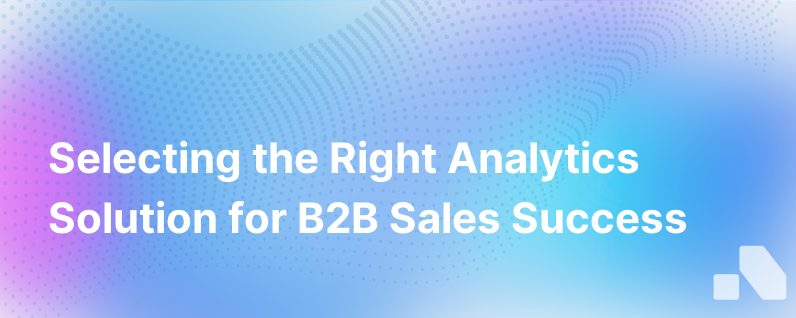How B2B Sales Leaders Pick An Analytics Solution
Published on November 25, 2023 by Sawyer Middeleer
In today's data-driven business environment, analytics solutions are essential for B2B sales leaders looking to optimize their sales process, enhance performance, and gain a competitive edge. However, selecting the right analytics solution from an increasingly crowded market can be a daunting task. This thorough blog post will provide a comprehensive guide to help sales leaders navigate the selection process of an analytics solution that aligns with their business goals.
Understanding the Need for Analytics in B2B Sales
Analytics play a pivotal role in sales by offering insights into market trends, customer behavior, sales performance, and forecasting. Good analytics can be the difference between closing a deal or missing it entirely. Metrics driven sales organizations aren't flying blind – they have information at their fingertips that directly impacts their bottom line.
However, it's not just about having data; it's about having the right data. The incredible potential for personalization in B2B environments – where sales cycles are longer and relationships more complex – necessitates an analytics solution that not only aggregates data but also interprets it in meaningful ways.
Key Considerations When Choosing an Analytics Solution
When evaluating analytics solutions, B2B sales leaders should consider the following factors:
Business Alignment
The solution must align with your company's sales strategy and business needs. Define your key objectives – is it forecasting, pipeline management, or customer engagement analytics that you're after? Establish clear goals and select a solution that supports achieving them.
Data Integration and Management
An effective analytics solution should integrate seamlessly with existing systems, such as CRM, ERP, and marketing automation platforms. It should efficiently handle the volume, velocity, and variety of data, turning it into a unified stream of actionable insights.
Usability and Accessibility
User adoption is critical for the success of any tool. Pick a solution with an intuitive interface that requires minimal training. Additionally, consider mobile accessibility; sales reps often work in the field, so they need access to analytics on-the-go.
Real-Time Analytics
Speed is crucial in the sales world. Real-time analytics enable quick, informed decision-making. Choose a solution that can deliver up-to-the-minute insights for a competitive advantage.
Scalability
The chosen solution should accommodate growth. As your business and data needs expand, your analytics tool must scale accordingly without performance issues or exorbitant costs.
AI and Machine Learning Capabilities
Artificial intelligence (AI) and machine learning can provide predictive analytics and sophisticated modeling, which are indispensable for strategic planning and forecasting. These technologies can automate complex processes, uncover patterns, and recommend the next best actions to drive sales.
Customization and Flexibility
No one-size-fits-all in analytics. Your business will have unique metrics and KPIs to track. Pick a solution that offers flexibility to customize dashboards, reports, and insights that resonate with your specific business processes.
Compliance and Data Security
Ensure the solution complies with relevant industry regulations (such as GDPR) and incorporates robust security measures to protect sensitive data.
Vendor Support and Community
Consider the support and services the vendor provides. Additionally, a strong community can provide insights, best practices, and additional support.
Total Cost of Ownership
Evaluate not just the implementation costs but also the ongoing expenses associated with the solution, such as licenses, updates, and training.
The Process of Selecting an Analytics Solution
With the considerations listed above in mind, B2B sales leaders can follow a structured process to select the most appropriate analytics solution:
-
Identify Your Needs: Start with a thorough needs analysis. Involve key stakeholders and understand their expectations from an analytics tool.
-
Market Research: Conduct extensive market research to identify the solutions that meet your criteria. Look at industry reports, customer reviews, and analyst ratings to shortlist potential candidates.
-
Request Demonstrations: See the analytics solutions in action. Request demos and gauge how well the insights presented align with your business needs.
-
Consider Integration: Dive deep into the compatibility of each solution with your existing tech stack. The smoother the integration, the better the user experience and data consistency.
-
Evaluate AI Capabilities: Examine the tool's ability to learn from your data and provide predictive insights. This futuristic edge can be a game-changer for decision-making in sales.
-
Security Checks: Prioritize data security by understanding the vendors' security policies, certifications, and compliance standards.
-
Implement a Pilot Project: Test the solution in a controlled environment with a subset of your data and team. Assess usability, performance, and the quality of insights generated.
-
ROI Analysis: Estimate the return on investment. Look at both tangible and intangible benefits such as time saved, increased accuracy in forecasting, and sales performance enhancement.
-
Vendor Discussions: Negotiate with vendors on pricing, support levels, training, and customization potential.
-
Make a Decision: Based on your evaluation, select the analytics solution that offers the best alignment with your goals, integration capabilities, and value for money.
Conclusion
In conclusion, choosing the right analytics solution is a strategic decision that requires careful consideration of your company's unique needs, goals, existing technology stack, and the potential return on investment. By following a systematic approach and prioritizing factors such as integration, real-time capabilities, scalability, AI technology, customization, security, support, and cost, B2B sales leaders can make an informed selection that best serves their organization's objectives. Remember, the chosen analytics solution is more than a tool; it's a lever that will enable your sales force to excel in a competitive market and achieve sustained success. A well-selected analytics solution like those Aomni offers can not only revolutionize your sales team's performance but also contribute to the overall growth and success of your B2B startup.